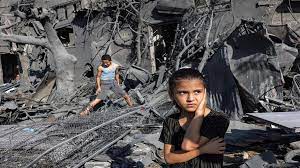Fawaz Turki
No, it’s not true, as psychotherapists and other clinicians would have us believe, that while contemplating mass suffering, especially mass suffering beyond all rational understanding such as that we are witnessing in Gaza, our empathy quotient decreases as the number of victims and the degree of mayhem increases.
This happens presumably because our brain at that time goes numb as it contemplates the unspeakable, or in the words of Joseph Conrad, as it “penetrates deeper and deeper into the heart of darkness”. What is true, rather, as those of us who contemplated images of the pain-haunted faces of ordinary Palestinian men, women and children in Gaza waiting to perish by an air strike or die slowly of dehydration, unattended wounds, starvation and the like, is that the more these victims’ suffering increases the more we feel with them – indeed the more we share it with them.
The war in Gaza has entered its fourth week and the death toll, as I write this, has already topped 8,000, including well over 3,000 children, with more than 20,000 injured – this inflicted on a people inhabiting a little, tormented strip of land 25 miles long and six miles wide, inhabited by 2.3 million souls. And that toll, as we all know, is expected to climb more rapidly as Israel continues to expand its ground offensive and air strikes. As our mind then penetrates deeper and deeper into that heart of darkness, the realisation dawns on us: Gaza, once described as a prison camp, is now being turned into a death camp.
The brute ferocity with which Israel has waged this war – a ferocity transparently mixed with hatred – is made all the more deadly as it makes its goal the wholesale annihilation of anyone who moves and anything that stands in Gaza, a war waged against a civilian population but disguised as a war against Hamas. How else to see it? Israel’s terror-bombing of this little strip of land over the last four weeks is now being seen by the overwhelming majority of people in the world as the most controversial military campaign in modern history, comparable in its brutality to the bombing of Dresden in February 1945, at the tail end of the Second World War, which turned the German city into rubble and killed roughly 25,000 of its inhabitants – an act designated in the history books as a war crime. No wonder then that the horrors in Gaza have stirred a wave of global protests. “Across the world, protesters have taken to the streets in great numbers”, according to a review in the Washington Post on Monday. “The aggregate figure of participants is hard to gauge, but it could well be in the millions”.
Look, when you expose helpless human beings, which is what Gazans are, to the murderousness and the caprice of the inhuman, which is what Israel is displaying in the Gaza Strip, human beings everywhere, those certainly with a penchant for siding with the injured party in the dispute, the underdog, as it were, are likely to take to their streets, to their podiums and, for that matter, to their rooftops and tell you publicly where they stand.
That’s how the world feels today. Now, you wonder, how do Palestinians themselves feel? As a Palestinian myself, whose work has for decades been devoted to exploring the energies of spirit that animate his people’s long struggle for freedom, and the role that remembrance plays in that struggle, I will tell you this: Never before, over the last 75 years, has anything triggered in Palestinians the dread realisation that they may these days be living through another Nakba – a meta word in every Palestinian’s semantic fashion of expression that refers to the catastrophic event in 1948 that culminated in the dismemberment of the Palestinian people’s home and homeland. The thought of it is haunting. It sends chills up your national spine.
And, yes, we Palestinians see this war as truly bloody – Lord, to be a father in Gaza today is to pass a death sentence on your own children – but we also see it as extremely tragic. And in enduring tragedy, as our poets and prophets tell us, respectively in their verse compositions and in their holy texts, victims of oppression always emerge ennobled by the spite of their enemies.
If Gaza today were a painting, it would be Picasso’s Guernica, the most powerful painting in history about the horror, suffering and chaos that a war, devoted to overkill, such as that waged against the people of Gaza, could wreak. How could we, diaspora Palestinians ask themselves, living as we are, comfortably, safely in our adopted homelands, sit back and … well, watch, just watch, that horror, that suffering and that chaos on our TV screens? And why is it that, by a trick of fate, we are diaspora Palestinians not there to share it all with Gazan Palestinians?
You know, there may be latent in our guilt-ridden sensibility a kind of envy, a dim resentment, that we are, unlike our fellow-Palestinians there, missing our rendezvous with hell. The Palestinians have never evinced fear since the day we first made contact with the Zionists a century ago? Have you heard them declare ‘mission accomplished’ ever since they made contact with us? Negative, baby. We are native to this land. We have inhabited Palestine since time became time and we will continue to inhabit till the sun dies.
Gulf News







